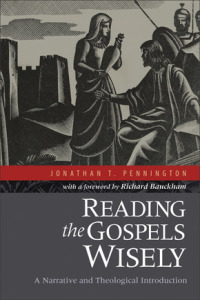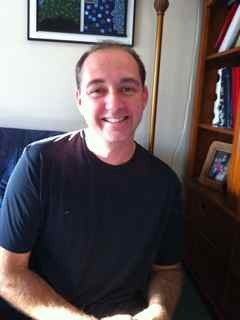Jonathan Pennington: Reading the Gospels Wisely
 Jonathan T. Pennington, Reading the Gospels Wisely: A Narrative and Theological Introduction (Grand Rapids: Baker, 2012), 268 pages.
Jonathan T. Pennington, Reading the Gospels Wisely: A Narrative and Theological Introduction (Grand Rapids: Baker, 2012), 268 pages.
Employing a narrative-theological approach to understand the Gospels, Pennington uses lively prose but maintains a rigorous scholarship governed by a great respect for Scripture. Pennington writes in the same historical and theological hues of Martin Hengel and Richard Bauckham, following the latter’s argument for apostolic eye-witness testimony closely. Eminently practical, Pennington writes so that “readers will be invited into the joy of studying the Gospels more deeply and more often” (258) and to lead readers to respond to the Gospel’s message of faith in Jesus Christ.
Pennington reconnects the church and the academy, erasing the disjuncture between Scripture and the people. Preaching and teaching the Gospels is not some addendum tacked onto Pennington’s hermeneutical project: “I take guidance and courage here from the model of Augustine, whose one-thousand-year best-selling textbook on hermeneutics has for its final climactic section, a lengthy discussion of how to preach” (219). For Pennington, the Gospels are Holy Scripture: a meal to be eaten and not an FDA report on the organic components of a foodstuff. Contra form-criticism, we should not be concerned with the Sitz im Leben [German, “sit in life,” life-setting] of a text but its Sitz im unserem Leben, that is, “our life-setting” (156).
The book breaks up into three sections: “Clearing the Ground, Digging Deep, and Laying a Good Foundation” (chaps. 1–8), “Building the House through Wise Reading” (chaps. 9–10), and “Living in the Gospels House” (chaps. 11–1). Pennington first traces the development of the word “gospel,” which initially referred to the kerygma [Greek proclamation], but then the notion of written document was added to it. Pennington roots the gospel message in the Old Testament, especially Isaiah 40–66, which points Gospels study in the right direction. Chaps. 1–2 do a good job of defining the Gospels and forging the relationship between genre and hermeneutics. Gospels are broadly subsumed under the Greek category of bioi [Greek “lives,” biographies] (22). Pennington follows Richard Burridge, who has established the Gospels as Graeco-Roman bioi. Yet bios is a flexible genre and will inevitably share characteristics with “moral philosophy, encomia … and historical works” (23).
Going beyond Burridge, Pennington opts for “bios plus” (25). He follows Loveday Alexander, who points out that the Old Testament is “much more deeply prone to ‘bio-structuring’ than is classical Greek” (26). Alexander says that it is the biblical tradition that provides the Gospel narratives their “rich ideological intertextuality with the biblical themes of covenant, kingdom, prophecy, and promise—all features hard to parallel in Greek biography” (26). Pennington then borrows from Adela Yarbro Collins, who also critiques Burridge but adds the categories of apocalyptic and eschatology to Gospel bioi (26). Pennington agrees with Collins’ labeling Mark an “eschatological historical monograph” (27). But he emphatically notes that the Gospels are even more. They do not—as Greek bioi—merely tell of a dead figure with emulation in mind but proclaim the resurrected Jesus who is present for the readers. “This is good news, not just a biography!” (31).



